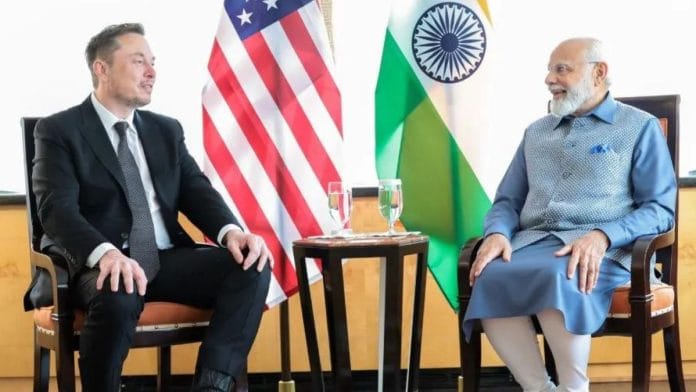It might not have lasted very long, but the meeting with Elon Musk was the one meeting of Narendra Modi during his trip to the United States that is hoovering up media attention. Musk, the chief executive officer of electric car manufacturer Tesla and the owner of microblogging site Twitter, space exploration firm SpaceX, satellite broadband provider Starlink, and also neurotechnology company Neuralink that is developing a brain-computer interface, is possibly one of the most important human beings to have ever existed on this planet, given the vast scale and spread of his investments. However, the buzz this time is centred around his renowned automobile company.
As has been reported in the Indian media, Tesla officials have been coming down to the country for visits with its senior bureaucracy. In a previous column, I mentioned that things have materially changed since Tesla’s initial forays into India. This time around, things seem far more serious for Tesla Motors, and it now appears that the company will set up a factory in India. Speaking to a senior executive in an automotive firm who is well-connected to the corridors of power, I learned that Tesla’s plans are firming up every single day. “Elon Musk does not do half-measures; he isn’t going to set up a small assembly line like the Germans. He will go the whole hog when, not if, he invests in India. There will be a proper car manufacturing facility and a battery gigafactory.”
India’s EV segment is still a growing one
India is a tempting market now, Shashank Srivastava, executive director of Maruti-Suzuki, once told me. The world’s third-largest carmaker after China and US is poised to sell more than 4.1 million vehicles this year. That said, the penetration of electric cars has been extremely limited. Of the 3.89 million passenger vehicles sold in India in the last financial year, automotive website ET Auto estimated only 54,297 units were electric passenger cars. That is a mere 1.4 per cent of the overall market.
Despite strides in affordability made by the likes of Tata Motors, electric cars in India are significantly more expensive than their petrol counterparts. This is because most of their components, including the critical batteries, are almost always imported from China, which dominates the world’s Lithium-Ion battery value chain. India holds just 0.2 per cent of the global battery manufacturing market compared to China’s utterly dominant 77 per cent.
Tesla cars are not cheap; the entry-level, standard range, single-motor Model 3 without any incentives costs around $40,000 (Rs 29.4 lakh) in the US, although incentives from states such as California can halve the price. However, the same car produced at scale at Tesla’s massive Gigafactory in Shanghai costs 229,900 Yuan, which, at the current exchange rates (1 Chinese Yuan = 11.5 Indian Rupees approximately), would be around Rs 26.5 lakh. And given how car prices have inflated in India, that is not a bad price at all; just over the prices of a top-end Maruti-Suzuki Grand Vitara Hybrid.
Of course, if a Tesla Model 3 is made in India, the price will be closer to the US one, given the need to import components from China. But even at an estimated Rs 35-40 lakh, the Tesla Model 3 will cost about as much as Chinese carmaker BYD’s Atto 3 in India, and well under the (almost) Rs 50 lakh price that Hyundai charges for the IONIQ 5.
Also read: EVs are duping you about carbon emissions. Govt should let diesel cars run longer
What Tesla’s entry would mean
If Tesla enters the Indian market with a full-fledged factory, not only could it completely upend the luxury car market in India with the Model Y and Model X, but it might also develop a smaller vehicle for markets like India. And it will not be alone in doing this; Hyundai and Kia are also discussing the same. While the Kia EV6 and Hyundai IONIQ5 have been winning plaudits, there is talk of an EV1 and IONIQ1, which would be the size of a Hyundai i20.
Even the Toyota-Suzuki combine has spoken of similar vehicles. The Indian market is indeed shifting to the slightly larger 4.5 metre-long SUV body-style vehicles. However, one cannot rule out that a Rs 30 lakh electric car would perform just as well. It might not come with a massive battery pack, but significant advancements in chemistries, particularly the frantic development of Lithium Solid-State Batteries (LiSSB) in Japan, and strides in energy management could still mean fantastic ranges. So a brand-new Tesla car could be developed for India, and it could even be called the Tesla Model 1.
Tesla is developing the ‘Cybertruck’, a pick-up truck for the American market where that body style continues to dominate. It could easily start work on smaller, more affordable vehicles even if it wishes to be the ‘Apple’ of the car industry. After all, Apple developed the iPhone SE as a lower-cost device to entice buyers to ditch Android devices. As for the factory, where could it come up? Do not hold me to this but, according to some of my sources, Uttar Pradesh could be a leading contender for a potential Tesla Gigafactory.
@kushanmitra is an automotive journalist based in New Delhi. Views are personal.
(Edited by Zoya Bhatti)






